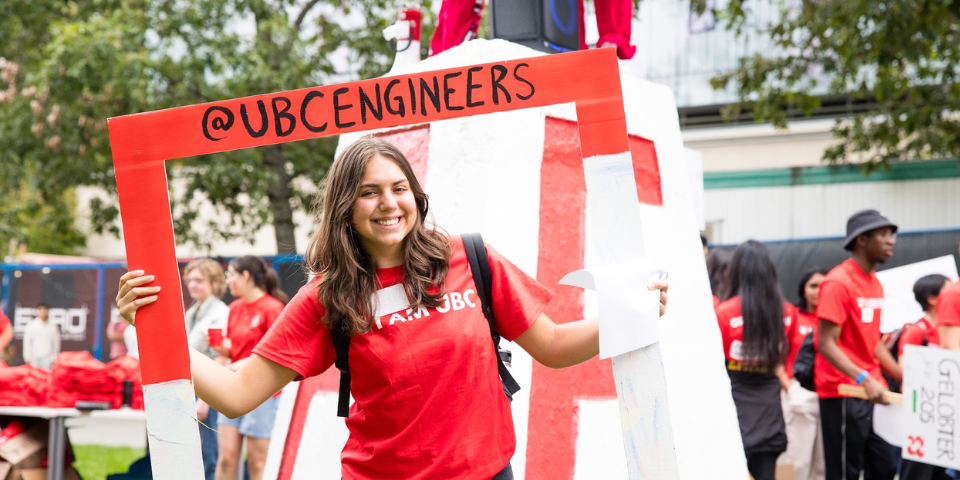
Civil engineers shape the world we live in—from the roads we drive on and the buildings we rely on every day to clean water systems, energy networks, transportation infrastructure, coastal protections, and the health of our land and urban systems. Their work supports daily life and helps build communities that are more sustainable and resilient for the future.
Civil engineers are in high demand, working for example as project managers or design consultants, across all industrial sectors and government.
Courses and lab work will cover topics such as soil mechanics and foundation design, construction management, design of steel, concrete and timber structures, as well as municipal infrastructure design, coastal engineering and environmental impact studies.
Focus your creativity and help build tomorrow’s world.
Okanagan Campus
Learn more at the Okanagan You UBC's program page or visit us at engineering.ok.ubc.ca.
Learn more about Civil Engineering at the Okanagan Campus
Vancouver Campus
Learn more at the Vancouver You UBC's program page or visit us at civil.ubc.ca.
Learn more about Civil Engineering at the Vancouver Campus
Why study this program
Civil Engineering graduates are able to work in a variety of different fields. Common areas of focus they can pursue include: construction, transportation, structural and earthquake, environmental, water resource, structural materials, and coastal.
Courses & specializations
Students will first complete a foundational first year of engineering and then take specialized courses beginning in second year, once they are placed into their engineering discipline. Here is a sample of the courses Civil Engineering students can take in each year of study:
Sample courses
| Year 2 | |
|---|---|
| CIVL 231 | Structural Mechanics |
| CIVL 250 | Engineering and Sustainable Development |
| CIVL 203 | Technical Communications in Civil Engineering |
| CIVL 210 | Soil Mechanics I |
| Year 3 | |
|---|---|
| CIVL 300 | Construction Engineering and Management |
| CIVL 340 | Transportation Engineering I |
| CIVL 301 | Modelling and Decision Making in Civil Engineering |
| CIVL 331 | Steel and Timber Design |
| Year 4 | |
|---|---|
| CIVL 430 | Design of Concrete Structures |
| CIVL 417 | Coastal Engineering |
| CIVL 409 | Municipal Engineering |
| CIVL 413 | Design of Earth Dams and Containment Structures |
For a more in-depth look at the curriculum, please consult the Academic Calendar and course descriptions.
Enhance Your Education (further education)
Civil Engineering graduates looking to continue their education can pursue professional programs and graduate studies. The analytical and problem-solving skills students gain from an undergraduate engineering degree translate well into the qualities needed for Medicine and Law School. These students also make strong candidates for UBC’s Master of Engineering Leadership in Urban Systems, Integrated Water Management, and High Performance Buildings which offers the unique combination of business and engineering courses for students looking to further their studies in these fields.
Careers
With a mean base salary of $101,917 (source) and an expected employment growth rate of 1.5% over the next 5 years (source), graduates of Civil Engineering are well equipped to pursue careers in transportation industries, consulting companies, construction firms, and government organizations (source). Common career titles (source) for Civil Engineering graduates include: appraisal engineer, architectural engineer, bridge/tunnel engineer. structural engineer, environmental engineer, ocean engineer, sanitation engineer, soil engineer, water management engineer, traffic/air/rail/road engineer, noise engineer and more.
Employers
Both current students and graduates are able to work for a wide range of employers. Some of the biggest employers of UBC Civil Engineering students over the past several years include: Ledcor Group, PCL Construction, WSP, Kiewit Corporation.
Alumni
Design Teams & Clubs
Design teams
There are over 30 Engineering Design Teams at UBC. Joining an engineering design team is an excellent opportunity for students from all disciplines to collaborate on a wide variety of design projects and gain relevant teamwork, leadership, and technical skills transferrable to future careers. Design teams related to Civil Engineering include:
- Concrete Canoe Team
- Concrete Toboggan Team
- EERI Seismic Design Team
- UBC Steel Bridge Team
- Third Quadrant Design
- UBC Smart City
See full list of UBC’s Engineering Design Teams.
Clubs
There are many ways engineering students can get involved, including joining clubs relevant to their discipline. Clubs relevant to Civil Engineering include:
- Canadian Society for Civil Engineering Student Chapter
- Civil Club
- Engineers Without Borders
- UBC Institute of Transportation Engineers
Research
The Department of Civil Engineering is involved with many areas of research and has access to impressive research facilities including the Earthquake Engineering Research Facility located on campus. Areas of research within the department include:
- Environmental Systems Engineering:
- Environmental Systems Engineering (ESE) is a field of study that focuses on protecting the health of our water, land and urban systems. Over the past 30 years, the ESE Group at the University of British Columbia has been a global leader in the field of Environmental Systems Engineering. Many of our current researchers focus include: recovery of nutrients and energy from wastes, microwave enhanced advanced oxidation process treatment of sewage sludge and production of high-quality water.
- Environmental Fluid Mechanics:
- The Environmental Fluid Mechanics Research Group at UBC seeks to examine the fundamental role of fluid motions in determining environmental quality. Their research team approaches physical problems of contaminant transport, stratified flows, mixing, turbulence and ice-water interactions.
- Geotechnical Engineering:
- Research activities include laboratory and field testing for characterizing soil behaviour, and numerical modelling. These activities are conducted within a broader geotechnical community: the Vancouver Geotechnical Society is one of the most active in Canada. Current research focuses include: soil property characterization in the state-of-the-art soil mechanics research laboratory; laboratory testing of the interaction between soils and geosynthetics; in-situ testing for geotechnical and geo-environmental site characterization; field investigations of shallow landslides; numerical analysis of earth structures; and soil dynamics and earthquake engineering.
- Hydrotechnical Engineering:
- Current research focuses include: investigations of the movement of nutrients and pollutants in lakes, inland and coastal waters; sediment transport in rivers and tailings ponds; hydrologic modelling for flood control planning and management studies; river restoration; urban hydrology; application of optimization techniques and decision analysis to hydraulic design, the operation of multi-purpose reservoirs, lake water and river quality problems, fishery management and the design of water resource systems.
- Structural Materials Engineering:
- The general emphasis of research in the Materials program is on the relationship between the structure and the mechanical properties of Civil Engineering materials, especially Portland cement and concrete, timber, and composites. Some more specific topics of current and planned research include the following: mechanical properties and durability of Portland cement concrete (plain and fibre-reinforced); permeability of Portland cement concrete; shotcrete (wet and dry processes); shrinkage, cracking and durability; impact/blast resistance of concrete and fiber reinforced concrete; fracture and deformation of wood; use of fiber reinforced plastic composites for new construction and repair, and use of recycled materials in concrete.
- Project & Construction Management:
- Research in Project and Construction Management is focused on the development, use, and exchange of Building Information Models (BIM). BIM involves a new approach to project delivery that focuses on developing and using an information model of a facility to improve the design, construction and operation of a facility. Two themes, information sharing and data integration through BIM and BIM for the project lifecycles, guide the research program.
- Transportation Engineering:
- The Transportation Group has an active research program with the British Columbia Ministry of Transportation and Highways in highway engineering and highway safety. The main research areas include: road safety, transportation planning, and intelligent transportation systems. The research is also applied to projects are in road safety, truck impact, transportation system simulation, traffic engineering, transportation demand and forecasting, environmental impact of transportation, and intelligent transportation systems.
- Geo-Environmental Engineering:
- Geo-environmental Engineering research at UBC focusses on understanding contaminant fate and transport, emerging contaminants and persistent organic pollutants, personal care products, hydrophobic organic pollutants and heavy metals; pollution control and remediation in the soil/sediment/water; utilizing waste-to-resources in the aim of achieving cradle to cradle circular economy. The group has long history of working closely with industry and partnering with local, provincial and national governments in solving emerging environmental issues.
- Structural & Earthquake Engineering:
- Current structural research at UBC includes analytical and experimental work in seismic engineering; mechanical properties and reliability of concrete, timber, and fiber-reinforced concrete structures; laboratory investigations of structural steel and structural concrete behaviour; numerical analysis of continua, expert systems and computer graphics.
Minors & Dual Degrees
Engineering students are able to complement their studies with 5 Minors available or a Dual Degree with Arts. Students interested in a minor can apply to their chosen option in their third year of study. A minor or dual degree will likely extend your degree past 4 years.
Co-op
Participation in the Engineering Co-op Education program gives students the opportunity to gain up to 20 months of paid relevant work experience during their degree. This experience provides an excellent opportunity for students to explore different industries, apply their studies to the working world, and create connections with future employers. The Co-op program will extend your four-year degree to five years. Participation is optional and students apply to join Co-op in their second year of study.
International experiences
Students can embark on an unforgettable experience abroad while earning credits towards their engineering studies. Opportunities include the Coordinated International Experience (CIE) exchange program, the Go Global exchange program, and the Global Engineering Leadership courses. The CIE program is customized for Applied Science students and features 18 international partner institutions across 3 regions. All of the international experiences have allowed students to build an international network of peers, professors, and potential employers.














